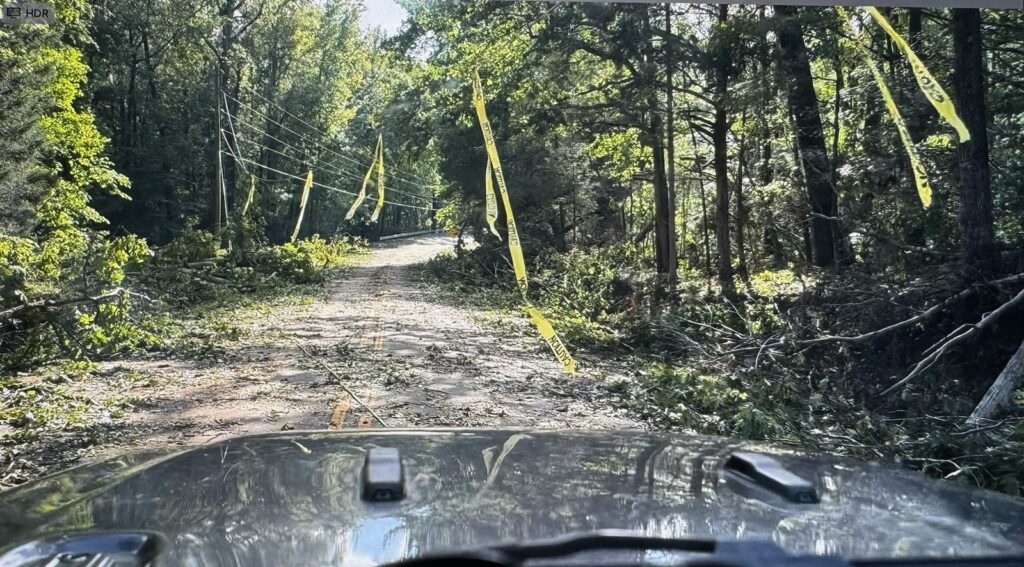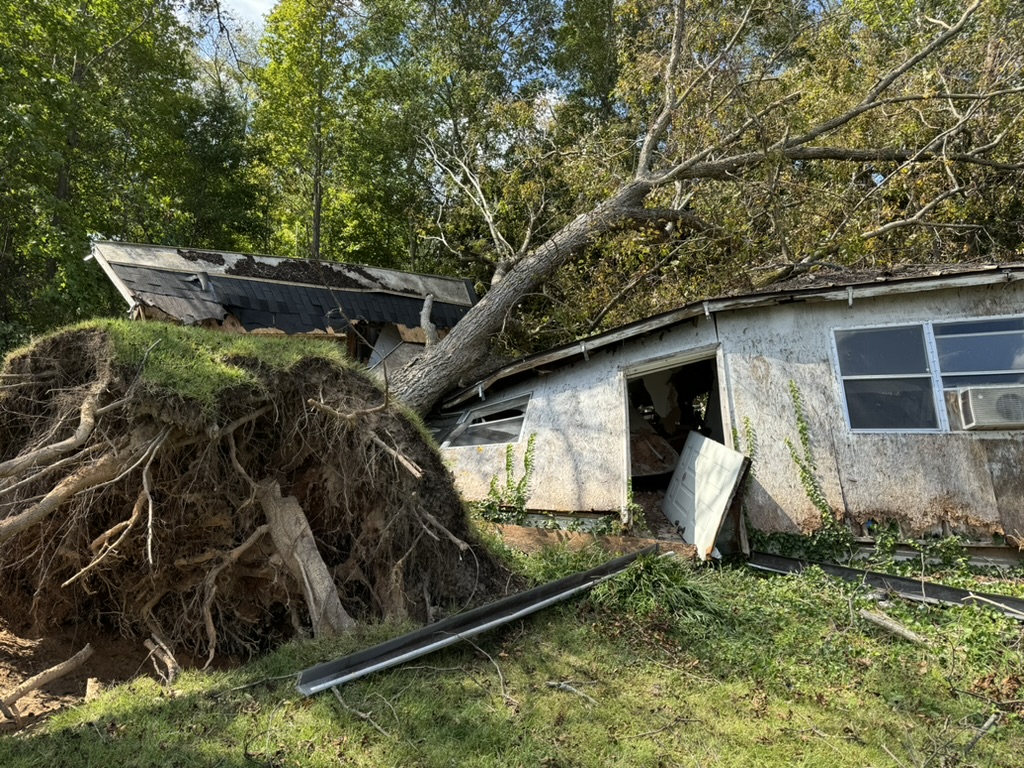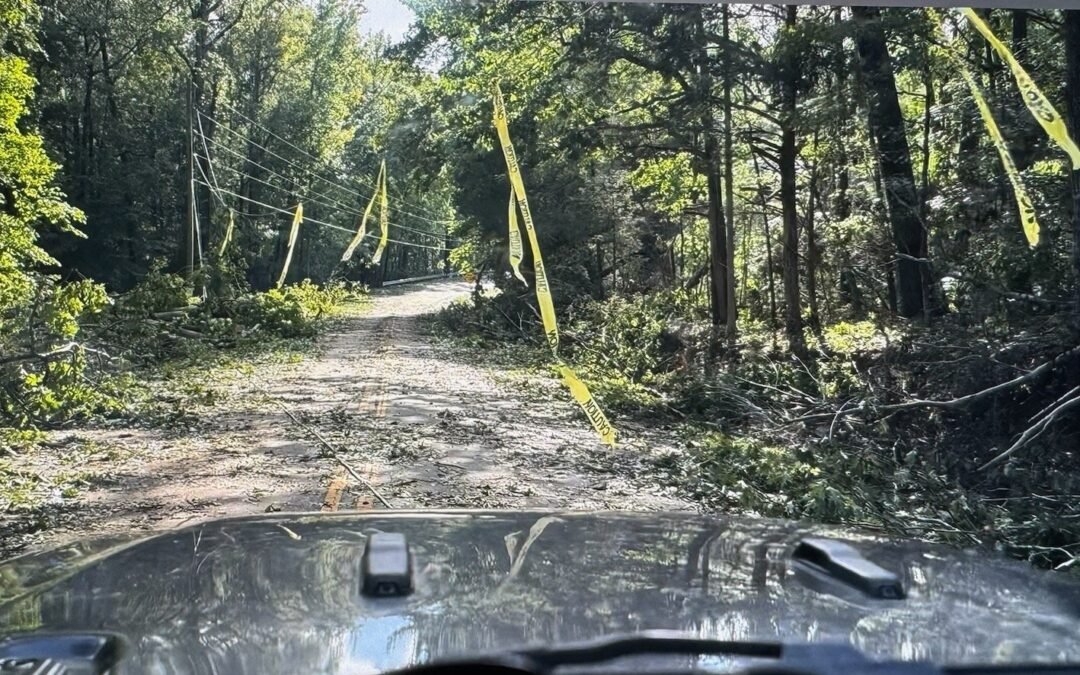In the early morning of September 27th life changed for millions of people, including me and my family. As the storm came into our area of upstate South Carolina, we sat in the dark and listened to the wind snap the large trees around us like twigs. We looked out the window to see the rain blowing sideways, anxiously waiting for the storm to finally pass. When we finally walked outside around noon, the world was eerily quiet. No cars, no planes, no TVs or music… only the chirping sound of birds announcing that it was safe to come out.
We spent the next week with no power (thankfully, we had water). There was no internet to read the news or check emails, social media interaction was almost impossible, and the cellular grid was so damaged that I could rarely even send a text message. As someone who works remotely, my professional world had just stopped spinning.
Over the next few days, we ate out of cans and scavenged the town for simple luxuries like ice for the cooler and a candy bar. At night, we sat in the dark and talked to each other. There were no distractions… we became our own entertainment. Around the third day, I noticed something about myself (other than that “earthy” aroma): I was happy. The usual stress, anxiety, irritation, and even depression was gone. I was actually enjoying the experience of “involuntary camping.” Being the overly analytical person that I am, I took a couple of days to break this down and figure out why my mood had so dramatically improved. The answer hit me around 4am one morning… My life had become really simple really fast. This was almost like a nice staycation where, for the first time in years, I didn’t focus so much energy into outside endeavors. No distractions, no background noise, no outside stressors pushing in on me. I only had one job: feed the family and keep them safe.
Once I had this Aha moment, my perspective about life in general began to shift. I was seeing my world in a different way and the contrast between the old and new vision was stark. These are just a few of the lessons I learned:
- Most of my stuff is useless. Having stuff can make life easier, but it can also become a distraction that creates unnecessary stress. When the power went out, most of my personal belongings went with it and served no purpose. All of these things immediately became more of a hinderance than a help, being just one more thing for me to trip over. Even my Jeep that I’ve always loved was useless without gas to power it and couldn’t adequately haul some of the supplies I needed to function. This was a good reminder to place value on the things that serve a purpose, not just the stuff that gives a temporary mood boost.
- Personal connections are more important than digital ones. It was actually nice to step out and see the neighbors on their porch, talk to them, and offer to share what little supplies we had. I can’t send food or ice through email, but I can carry these things next door and be of service. I got to see our neighbors come together to clear roads and clean up debris, share supplies, and provide comfort where needed. That basic humanity and unity just isn’t possible in the digital world.
- Don’t do what you don’t love. I didn’t realize the immense amount of stress that I was under every day just so I could provide certain business services for a particular client. When I was completely cut off from that work, my stress levels dropped and I started acting like me again. If you aren’t passionate about what you’re doing, then you’re not in the right role.
- Be quiet. I’m one that has always had some kind of background noise… even sleeping with the TV on. Sometimes your mind needs silence to adequately process everything it’s dealing with. The background noise, even when you’re not paying attention to it, can put your brain in multitask mode. Humans aren’t made to multitask. We can do it for a while but it’s not sustainable. Give your brain a break and enjoy the silence.
- Balance is necessary. It’s easy to fall into the trap of being plugged in to work, especially if you work from home. Give yourself a “clock out time” and stick to it as best you can. Unplug and spend time with the people that truly matter in your life. Work comes and goes, but these loved ones are the constant that will help you maintain a proper balance in life.
- Always have a CYA plan for your business. One of my clients relies heavily on me to manage certain administrative duties, now more than ever since a key employee retired a few weeks ago. Although they weren’t directly affected by the hurricane, my inability to perform certain tasks put them in a very real financial crunch. Their business would have been barely disrupted last week if there was a Plan B, someone with a basic working knowledge of what I do for them. I’ll admit that I was as shortsighted with this as the client (my wife would be so happy to hear me admit that I was wrong, lol), but now we know and we’re putting together a CYA plan.
My biggest and best takeaway from all of this? Life is precious. We shouldn’t take those small moments for granted or postpone the big moments. We never know what could happen that keeps us from enjoying them later. This storm brought so much death and destruction to a region that never thought something like this could happen. Even the old timers in town say they’ve never seen anything like it. All I really lost is a week, but so many suffered life altering loss. Live now, take care of the people around you, and focus your energy on what’s really important in your life.

This was day 3 in my neighborhood. Neighbors had come together with chainsaws and tractors to clear enough space in the road for a car to pass through. Someone was even thoughtful enough to hang caution tape on the downed power lines to keep large vehicles from catching them as they passed.



